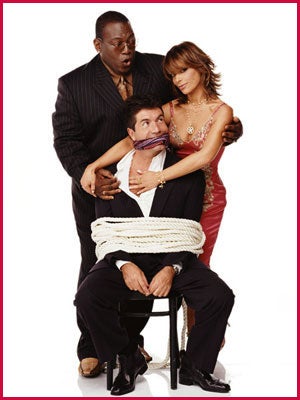Long ago, back in the ancient 1980s and ’90s, if a TV show ran for more than eight seasons, it was on par with winning a lifetime achievement award at the Emmys. Not only were you in the magic circle of perpetual wealth known as syndication, but you’d managed to entertain a fickle audience and survive multiple network regime changes.
 But there was always a difference between the shows that went off the air when their audience was still clamoring for more ("Friends," "Seinfeld") and when they limped off the air with a whimper, with a barely a ripple in the TV pool.
But there was always a difference between the shows that went off the air when their audience was still clamoring for more ("Friends," "Seinfeld") and when they limped off the air with a whimper, with a barely a ripple in the TV pool.
"American Idol" changed TV. You can argue for better or worse (better is audience voting, worse is obviously Seacrest), but the show altered the landscape, ushering in a new dynamic. Now the viewer didn’t just sit on the couch and watch characters. They could audition for the show themselves! Vote for their favorites! Buy the music! Attend the concert! Make Simon Cowell a gazillionaire! It was practically a epidemic and one that at certain points in its eight-year Godzilla-like run, infected a large part of the population.
If you weren’t watching, if you didn’t have a favorite judge or a favorite singer or didn’t know what happened the night before, then you had no business showing up at school, the office or the senior center the next day.
I started watching "Idol" years ago because I love music. I stayed for Cowell and the epic silliness of the show. I never voted because I draw the line at engaging with my TV shows (especially when they turn entertainment into a telethon).
There was a certain shoddy Fox charm to the show in the earlier years, when the contestants didn’t have veneers, spray tans and perfect bodies but had to win our hearts and minds with a $50 clothing budget and snaggle-tooth smiles. The idea that a girl from a tiny town in Oklahoma could become a huge star called Carrie Underwood is the entire premise of the show.
For me, the pinnacle was last season’s Adam Lambert, who treated every performance as a tour de force combination of Elvis and Cher. The show made stars of the judges, made winners out the losers and gave 15 minutes of fleeting fame to everyone it touched. For God’s sake, it gave Paula a stalker!
But this is the first year that I stopped watching "American Idol" cold turkey. Once Paula got kicked out of the house she helped build and Ellen came on board, it didn’t seem like it could be the same (although you can make the case that Kara was the actual death knell). But when Simon announced that he was leaving at the end of this season, there didn’t seem to be much point to hanging out at the wake when you knew how it would wrap up.
There’s been much made about the ratings being down, but for me, it’s a lack of interest in what made the show great.
Over the years, the show got more glamorous and full of itself. The judges seemed bored and blasé. The contestants had grown up watching the show and knew all the angles. It became a parody of itself.
But rather than go out when it was still a juggernaut, the show decided that it wanted to be kept alive by any possible measures rather than choosing a dignified Do Not Resuscitate exit. While its audience has rediscovered sitcoms and dramas and moved on to other reality shows, "Idol" continues to limp along with its now rotating cast of judges, trying to hold on to faded glory.
Even though the season ends in a few weeks, I’ve already said goodbye to "Idol" and its off-key auditions, Seacrest mugging, Simon’s double entendres, brave contestants with sad stories and the inevitable letdown of the winner.
It may take others a few more years before the show finally takes a bow, but by then it will be a faded version of its former self. But we’ll always have Seacrest.
